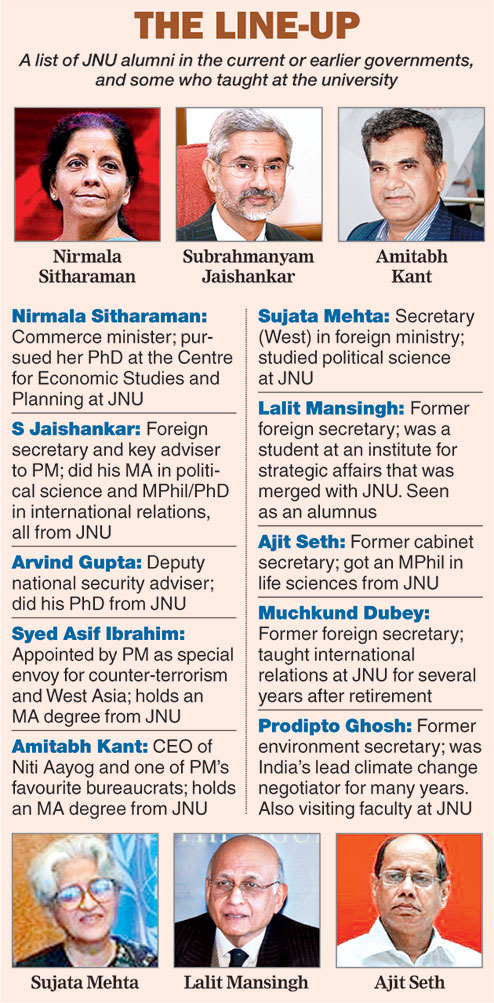New Delhi, Feb. 15: When BJP MP Maheish Girri labelled Jawaharlal Nehru University a "hub of treason" on Saturday amid the police crackdown on the campus, he was unwittingly belittling not just rivals but also key political, diplomatic, bureaucratic and education leaders of his own party's government.
Many supporters of the arrest of JNU Students Union president Kanhaiya Kumar and the imposition of sedition charges on multiple students from the university have over the past three days blamed the institution's intense student politics, frequently dominated by the Left.
Some, especially on social media, have even questioned why the government is funding a university churning out what they insist are "anti-national elements." But without JNU graduates, the Narendra Modi government would stand bereft of several among its most recognisable and eminent figures - just as many of its predecessors would have struggled without some of the university's alumni.

Commerce minister Nirmala Sitharaman and department of industrial policy and promotion secretary Amitabh Kant - the force behind Prime Minister Modi's "Make in India" campaign -are both JNU graduates.
Foreign secretary S. Jaishankar and deputy national security adviser Arvind Gupta, both handpicked by Modi, earned their PhDs at JNU.
The university is alma mater to Syed Asif Ibrahim, the former Intelligence Bureau chief who was appointed by Modi last year as his special envoy on counter-terrorism, with a focus on West Asia. And at least 15 Indian ambassadors currently serving abroad, and three division heads in the ministry of external affairs - tasked with protecting India's strategic and diplomatic interests - studied at JNU.
They are only keeping up a tradition as old as the institution, with JNU supplying yearly cadets to the civil services since its inception in 1969 - and in some cases, even earlier.
"If anti-India slogans were raised, that is unfortunate and not something I'm okay with - but a campus-wide crackdown, arrests and charges of sedition like what we're seeing appears totally disproportionate," former foreign secretary Lalit Mansingh, who studied at an institute on strategic affairs that was merged with JNU, told The Telegraph. "The intense debates JNU is known for are rooted in what we had in my time, though the sharpness of ideological biases has increased."
Girri had in a series of posts on Twitter on Saturday suggested that JNU had turned into a playground for terrorists. "Terrorists, traitors and terrorist sympathizers have been invited on regular intervals to toxify minds [sic]," Giri said. "Sad, a central university has been reduced to a hub of treason."
The Left's domination over student politics in JNU isn't new, though RSS student union Akhil Bharatiya Vidyarthi Parishad and groups like the Free Thinkers, which shunned ideological tags, have led the students body, too. But independent of the dominant student group at any time, the university has produced some of the country's top civil servants, apart from political leaders of all hues.
Former cabinet secretary Ajit Seth - who was India's top bureaucrat for four years from June 2011 to June 2015, a period spanning the UPA and NDA governments - pursued his MPhil in life sciences from JNU.
BJP president Amit Shah today blamed a "Leftist ideological inspiration" for the slogans students allegedly raised last week.
But Sitharaman, who was a member of the Free Thinkers group during her time in JNU, had in a 2009 interview to the university alumni wing lavished credit on the university for inspiring "anything I am today." "JNU most certainly provided me the best opportunity to participate in all sorts of debates and to think in a different way," Sitharaman told the alumni newsletter. "I must say that JNUites do things differently, wherever they are, and that's how they stand out."
Senior IAS officer Ali Raza Rizvi, currently a joint secretary in the central ministry of health and family welfare, credited the intellectual atmosphere at JNU with expanding his worldview. He studied history there from 1985 to 1987.
"Simple things like not remaining self-contained and looking beyond oneself, to observe and learn from society with a sense of humility, having a certain commitment towards the needs of the common citizen," Rizvi had told the alumni magazine in an interview last year. "The deep intellectual pursuit which the campus offered - that sort of pursuit, with its challenges - is extremely fulfilling."
JNU's allure has also brought many retired diplomats and bureaucrats to the university in the role of teachers. Former foreign secretary Muchkund Dubey taught international relations for several years. Prodipto Ghosh, a former environment secretary, was a visiting faculty member at the university.
Alumnus at DU helm
The Modi government itself quietly doffed its hat at JNU today, appointing a former professor from the institution, Yogesh Tyagi, the new vice-chancellor of Delhi University. The Union HRD ministry announced the appointment of Tyagi, who did his PhD in legal studies at JNU. He also holds an LLM degree from Columbia University.
The DU top post had been vacant since October when Dinesh Singh's term came to an end.
The Congress-backed Indian National Teachers Congress and Academics for Action and Development welcomed Tyagi's appointment.










